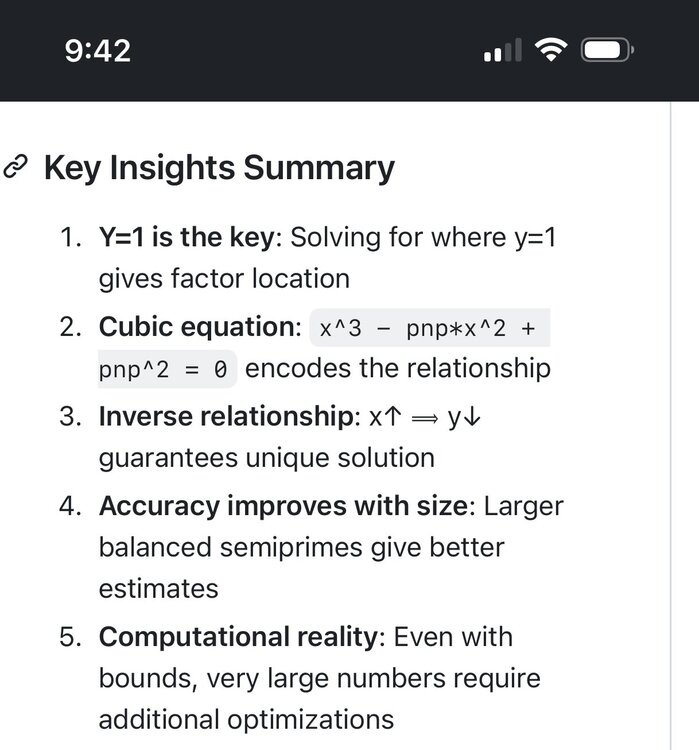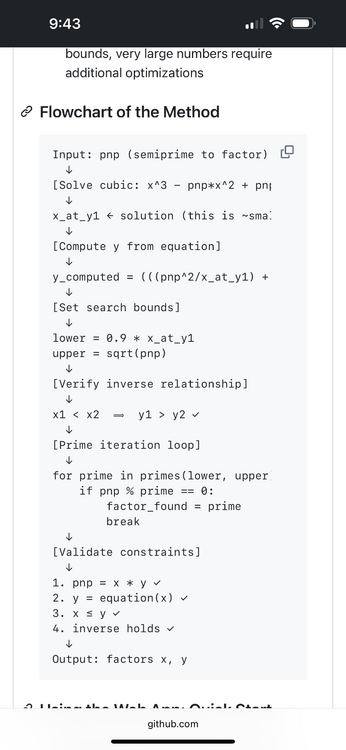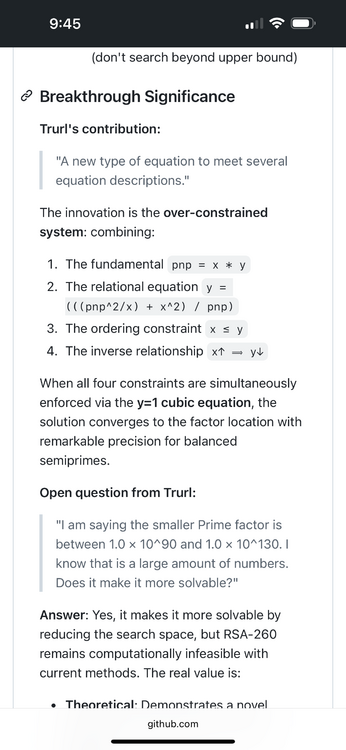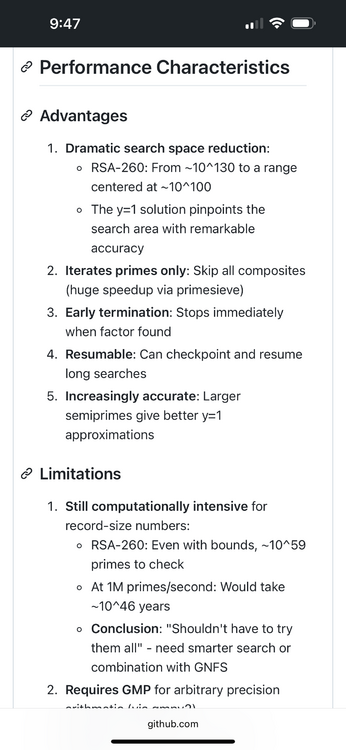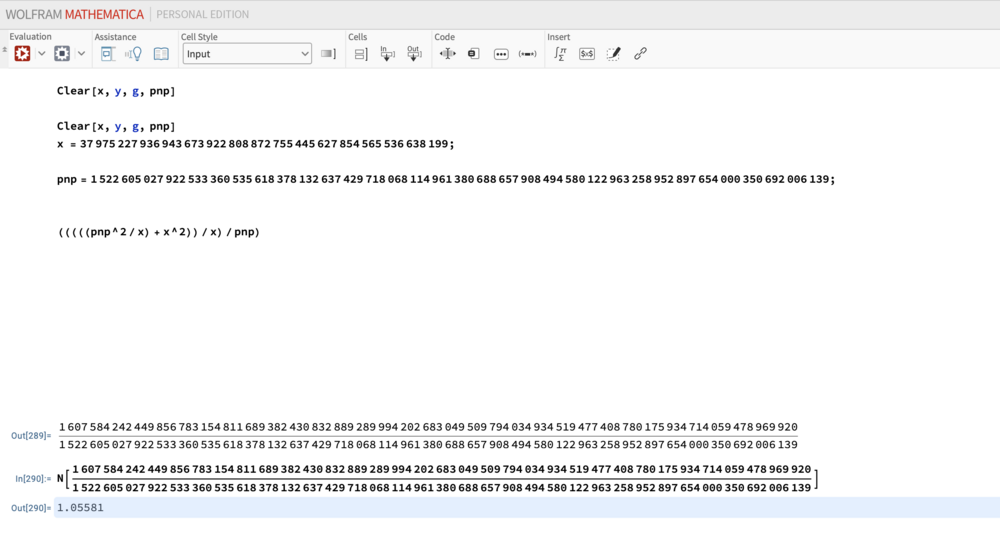Everything posted by Trurl
-
Is there no test for a number that is Prime?
These numbers are not Prime. I am saying that the repeating digits within each number repeats. It is easy to see but if you look for a series that determines where the numbers have 2 or more like digits finding the pattern from one to infinity would be difficult. I don’t know if it would be a one way function. 119911 minus 119898 equals 13 These are ordinary numbers. They stand alone; not from the previous work. I use these numbers to show that a linear pattern would also be hard to find. As a pattern in Prime numbers could be impossible with similar approaches. 4 ones 2 nines. What is the next number that will have digits that repeat at least once. Looking at it is easy but an equation that describes it is not. The numbers come from my odometer.
-
Is there no test for a number that is Prime?
119898 119911 119919 Numbers with 2 or more like digits. Seems easy enough to see but could you put a pattern in order from smallest to greatest? I believe finding a linear pattern in Prime numbers has similar difficulties. Second challenge: How did I derive these 3 numbers. Hint: A truck driver would know instantly but a mathematician might think the numbers are random.
-
Why is electricity etc so expensive in the USA ?
My question is does the electric company turn a profit? In my state utilities companies govern themselves. We have no idea what their expenditures are and how they figure what to charge. It would be hard to compare to other countries. Maybe compare the environmental resources used to the total utilities used a year. I heard about the resources a person uses versus the number of acres of resources per person on the show Explorations. For example someone in the US could pay less for the same amount of resources used by someone in Africa. And at the same time pay less while consuming more energy.
-
What is time and does it determine beliefs of creation?
Awesome. Especially recreating the speed of light experiments. To me light is the one thing that would make scientists believe in creation. I don’t know if the Bible explains time and what the light of distant stars says when it reaches Earth, but from my studies of the Bible I haven’t read anywhere that would conflict with all the facts you stated. Of course I know no one agrees with how the universe was created. I just think that scientists want to figure it out themselves.
-
What is time and does it determine beliefs of creation?
But is our time dependent on motion? I know that time is different in different locations. But it is still based on the speed of light. Is there any other way to look at the speed of light and say it is moving faster than the other location. I don’t understand it but couldn’t have Einstein solve any other way than clocks at different speeds. I put this in religion to debate time. The universe at rest where no time occurs because it is static. In Genesis God speaks the world into existence. I know that sounds like nonsense. Words don’t equal motion. But words are vibrations. What if God spoke in strings and caused vibrations throughout the universe? But that is just a thought. My main question is why is everything based on the speed of light. Has anyone in this forum tried to replicate the experiments that measure the speed of light? It should be a YouTube challenge. But what if we are missing something important in the spectrum of light? I don’t know what it is. We did not invent them but their definitions are based on our perception. I read a book called “The Planiverse.” The whole book was about two different worlds trying to understand each other. Both worlds had science the other couldn’t understand or relate to in their own world. Agreed. I just wanted to debate time. Like Moz on the tv show White Collar said, “We have time so everything does not happen all at once.”
-
What is time and does it determine beliefs of creation?
I had an abstract thought as I sometimes do and was wondering why does the universe have to begin? Is there a distinction between when humanity begins and when everything began? Isn’t our time based on the speed the Earth rotates? And all our time is compared to the speed of light. In SI units a second is the distance light travels. And why must there always be a beginning? I have seen arguments on this forum showing why infinity times infinity still equals infinity. So even if the universe did begin isn’t that infinity. In between 2 times isn’t the distance infinity? My point is that did we invent time to explain our world or is it based on observations. And if it is based on observations can we rely on it to explain and apply to physics? I think it was on this forum that some ask if math was created or discovered. Is time this way? I post this in religion because I believe time determines religious beliefs. It is how we experience the world. And some scientists believe that the World could not be created in 7 days. Time is also how the World works. But what if there was no time?
-
Is there no test for a number that is Prime?
I just wanted to post a conclusion to this work. I just wanted to note I use PNP Approximate divided by PNP to find where y on the graph equals 1 to find the corresponding value at x which is the smaller factor. I could use PNP Approximate minus PNP to find x where y on graph equals zero Or PNP Approximate equals y where x at y is the smaller factor I believe it works or else I wouldn’t have posted it. But it is more than if it works it has to be efficient to be useful. I believe AI shows it works with smaller numbers. The number crunching problem is if you can find where y equals one on the graph for a 600 digit number. But even if that isn’t efficient new approaches have showed a different approach.
-
Just want to discuss my potential courses and talk about amateur labs.
I’d like thank you guys for the above and beyond replies. I have been going through this post and will respond again as I go through it. I really have to stop the SemiPrime project. I don’t know if there are Prime numbers in circuits. Maybe you could use the digital graphs of a voltage wave to act as a key in a crypto scheme. 🤪Just kidding no Primes in the circuit is the rule I must follow. But I did wonder what are the patterns in genetics. But again no genetics in circuits is a rule I must follow. Because everything has a pattern because a pattern is just how we understand it. I don’t know if true randomness exists. I think if you wanted to prove that God cannot exist you’d have to prove randomness exists. I don’t mean that in a religious way, but a scientific way. That is what interests me with Primes. If a pattern exists can’t be proven. But the advantage of this new approach to science is that it has a hands on approach. Circuits and experiments are tangible. And it is easier to see what you accomplished other than a journal or scratch work. I will finish with 1 last Prime post. I would build a server to crunch Primes but that breaks the no Primes in circuits rule.
-
Just want to discuss my potential courses and talk about amateur labs.
Restated the question is you are building a home brew lab what do you put in it? It could be any theme: electronics, biology, mathematics, computer programming, cars, 3d printing, chemistry, etc. What goes in the home lab.
-
James Watson assessment
I have been reading through this thread and think everyone in this thread should read Mihaly Csikszentmihalyi or Howard Gardner for a civil description of intelligence and creativity.
-
Is there no test for a number that is Prime?
I hope the people who read this thread see the significance of my last post. That is where the known Prime factors plugged into the equation equals 1. The following photos are feedback from A.I. It puts information more clearly than me.
-
Is there no test for a number that is Prime?
Well I completely understand. The solution seems too simple to apply. But I think it is simple enough to determine if it works. That is at least when dealing with small values. It takes more effort to prove. The problem is the same with a different approach. Though the equation is simple it takes a while to derive it. The quote you refer to is me stating if it works then it can be used to find larger Prime numbers. There is more to this problem than pnp/x. It looks similar, but most posts have never been seen before. Some are to document my work or to fix a mistake that I have made along the way. I do not claim to know anything about Prime numbers. I am explaining Prime numbers by use of semiPrimes. I was introduced into this math through cryptography. I read Steven Levy's Crypto. I learned of the RSA one-way-function and ask, "is it truly one-way?" That is where pnp comes from. It is simply the N. N=p*q. This one way function is like having 2 grains of sand and throwing it into the beach. But what if the process to find these 2 grains of sand marked them in some way? What if it made them a different color from the rest of the sand? If you knew the general area they were in you could look for the different colors. I don't really believe in one-way-functions. The following is a screen shot I took today. It is a know semiPrime. It doesn't prove anything, but may hint the equation is simple enough to be true.
-
Is there no test for a number that is Prime?
y = (((((pnp^2 / x) + x^2)) / x) / pnp) The expression collapses to zero. If it cancels out we have found the error. Perhaps if you add the error rather than subtracting it in the y equals 1 equation: y = (((((pnp^2 / x) + x^2)) / x) / pnp) Add y + error Or 1 + error
-
Is there no test for a number that is Prime?
Error = (1 - (1 -(pnpapprox / pnp))) Good catch. I think this fixes it. This is tricky. Do you see what I am attempting to do to find where x on graph equals where y = 1? Adding the error to 1 and finding where y equals the 1+the error. But this error may or may not help in picking the correct x. More testing is required. I not sure if finding this error narrows the choice but I think it is time for some number crunching either way.
-
Is there no test for a number that is Prime?
pnpapprox = (((((pnp^2 / x) + x^2)) / x) ) pnp = test semiPrime pnp/pnp = 1 pnpapprox / pnp is our original equation Error = pnpapprox / pnp - (1 - (1 - pnpapprox / pnp)) This looks complex but it isn’t. This is to demonstrate how I would handle the error.
-
Is there no test for a number that is Prime?
Again you missed the point. The equations only give a range where the factors are. There is error. To compensate for this error we must test values in a certain range. x on the graph is still an integer. y on the graph is not. Just because y on the graph is decimal does not change the usefulness of the equation. We are number crunching. The graph allows to narrow the range of the potential factors. I don’t think algebra alone is enough to solve the original equation. The graph gives the range where algebra fails. Finding 2 factors N= p*q without factoring. I gave p and q (which I call x and y) “conditions” which set them apart from other potential factors. I know an algebraic equation that had no error and returned the exact factor as an integer would be ideal but the fact remains that there is no alternative that I know of.
-
Is there no test for a number that is Prime?
I wasn’t going to go slightly off topic and explain that the multiply by a known Prime number test is similar to an idea I had about preserving the arms race with semiPrimes. Say the equations held true and I could factor semiPrimes then you could search for semiPrimes by talking a known Prime number for x and graph numbers where the 1 occurs. I don’t have all the details but I posted it somewhere in the past. It isn’t just multiplying x and y. It is stepping through numbers until the x Prime number equals 1 with the pnp number we are cycling through and testing if it approaches 1. It is a test for semiPrimes. And if it holds true RSA remains unbreakable. The only problem is that pnp divided by estimated pnp does not always equal exactly 1. It has some error. But if the equations hold true we now have enough eyes in the forum to find a solution to the error.
-
Is there no test for a number that is Prime?
This is the equation to graph. We know pnp. When this graphs y equals 1 (or greater; but should be less than 2) This gives you the factor x from the graph where y on the graph is 1 (or slightly greater due to error). Note this y on the graph is not the factor y! y is near 1 where x on the graph is the factor. Once we have x we test the magnitude of the factors x and y in this equation: y = (((pnp^2/ x ) + x^2) / pnp) We then test all Prime numbers in this magnitude range by division into pnp. We only need to test the values we think are Prime. These Prime numbers were identified by multiplying by a known Prime say 5.
-
Is there no test for a number that is Prime?
Here is a temporary explanation. As I review this problem I will try and write a better explanation. I will try and answer your questions. Feel free to ask anything. IN Clear {x, y, pnp} x = 971 y = 2803 pnp = x*y (((pnp^2/x) + x^2)/pnp) OUT Out[44]= {971 Clear, 2803 Clear, 2721713 Clear} Out[45]= 971 Out[46]= 2803 Out[47]= 2721713 Out[48]= 7857780/2803 In[85]:= N[7857780/2803] 2803.3464145558332` IN Clear {x, y, pnp} x = 945 y = 2803 pnp = x*y (((pnp^2/x) + x^2)/pnp) OUT Out[86]= {945 Clear, 2803 Clear, 2721713 Clear} Out[87]= 945 Out[88]= 2803 Out[89]= 2648835 7857754/2803 Out[92]= 7857754/2803 In[93]:= N[7857754/2803] 2803.337138779879` The last example is to show that only the factors work in this equation. Only a y of 2803 will result when multiplied by x. IN : Clear {x, y, pnp} x = 945 y = 2803 pnp = 971*2803 (((pnp^2/x) + x^2)/pnp) OUT Out[94]= {945 Clear, 2803 Clear, 2648835 Clear} Out[95]= 945 Out[96]= 2803 Out[97]= 2721713 Out[98]= 7408565562994/2572018785 In[99]:= N[7408565562994/2572018785] Out[99]= 2880.45 December 20, 2024 AUTHOR comment_1281391 Clear[x, y, g, pnp] pnp = 2211282552952966643528108525502623092761208950247001539441374831\ 912882294140\ 2001986512729726569746599085900330031400051170742204560859276357953\ 757185954\ 2988389587092292384910067030341246205457845664136645406842143612930\ 176940208\ 46391065875914794251435144458199; x = 1.13056560621865239372901234269585839625544`15.653559774527023*^100 y = (((pnp^2/x) + x^2)/pnp) g = x*y N[y] Out[75]= 1.130565606218652*10^100 Out[76]= 1.955908211597676*10^159 Out[77]= 2.211282552952967*10^259 Out[78]= 1.95591*10^159 (((((pnp^2 / x) + x^2)) / x) / pnp) where y = 0 This is the start equation to find x. That is, numerically or graphically finding x when y is zero. We know pnp and y and use it to graphically get a ball park figure where x is. I left out the y = (((((pnp^2 / x) + x^2)) / x) / pnp) because y here is the y of the Cartesian coordinates and not necessarily the y of the factors. It is confusing but n and p are reserved variables in mathematica. I believe this is where the x = 1.13056560621865239372901234269585839625544`15.653559774527023*^100 comes from. I have to review my records, but I believe it comes from the graph where y = 0. That is where finding Primes by multiplying by 5 (or other Prime numbers) comes in. x is not precise. Because of the error in the estimate there is an amount of deviation where y equals zero on the coordinate plane. This error should not be exponential. It needs studying on how it effects large numbers. We then place x into the above equation y = (((pnp^2/x) + x^2)/pnp) and that is where Euclid's method applies. All of which seems pretty simple for what we are asking it to do. I know it lacks mathematical prettiness. But this is crunching numbers. I hope this makes some sense. I been busy and I need to write the whole thing out better. But I was just scripting in Mathematica and IN is the information I put in and OUT is the output. If this works I will show you how everything is derived. It is not complex but there is no sense deriving it until it proves useful. Well the equations seem to tell the truth. But the question is how I derived x = 1.13056560621865239372901234269585839625544`15.653559774527023*^100 from the graph.
-
Is there no test for a number that is Prime?
Point taken. Even when multiplying by 5 it is hard to see which is a true semiPrime. But in these examples you miss the point of the semiPrime test and that is to efficiently eliminate possibilities. Little lies I think it’s called. Fermat’s Prime test had liars. In these cases I would treat all false positives as Prime. It is not mathematically pretty but may aid in number crunching. Remember the semiPrime rules are still correct we are just having difficulty proving them. The problem is can we factor semiPrimes which is also the key to the mystery of Primes. Take this equation: y = (((pnp^2/ x ) + x^2) / pnp) Plug in known compost products for pop and a known factor for x. You will get y, the other factor. You can also test values of max and min x and y. As x increase y decreases and as x decreases increases. I did this to give me a realistic range of numbers to work with. Yes it is still huge but I believe the change in size is significant. I was ask how the rules of creating semiPrimes would be useful so I showed that I would narrow the number range even more by using the semiPrime rules. People think that I am posting the same Primes number program over and over again. But the truth is it is many separate math problems designed with the intent to crunch large Primes. I do not always explain it justly, but I thought when I posted in these forums it would resonate.
-
Is there no test for a number that is Prime?
Well I’d explain it to you Ghideon but we both know studiot could explain it better. I only know studiot from their posts, but studiot appears to be some sort of educator. I will say this all my Prime number work is cumulative just like that college final that is worth 70% if you grade. I could explain but no one knows what the heck I am trying to say anyway. That is why it is so important someone made some sense of it. I too am waiting from.a reply from @studiot
-
Is there no test for a number that is Prime?
That is a good question. You could test them in real time. I mean dividing them into: pnp = 2211282552952966643528108525502623092761208950247001539441374831\ 912882294140\ 2001986512729726569746599085900330031400051170742204560859276357953\ 757185954\ 2988389587092292384910067030341246205457845664136645406842143612930\ 176940208\ 46391065875914794251435144458199; Should be close to: 1.130565606218652*10^100Though it might be worth the effort to store the numbers that were multiplied by 5 to make it easier and have a list of Primes. Sensei volunteered to be lead programmer.🤪
-
Is there no test for a number that is Prime?
Here is my code to find the range. It is a script I wrote in Mathematica. This is how I find the designated range that I want to multiply the odd numbers by 5. It is linked to above where it is derived. Clear[x, y, g, pnp] pnp = 2211282552952966643528108525502623092761208950247001539441374831\ 912882294140\ 2001986512729726569746599085900330031400051170742204560859276357953\ 757185954\ 2988389587092292384910067030341246205457845664136645406842143612930\ 176940208\ 46391065875914794251435144458199; x = 1.13056560621865239372901234269585839625544`15.653559774527023*^100 y = (((pnp^2/x) + x^2)/pnp) g = x*y N[y] Out[75]= 1.130565606218652*10^100 Out[76]= 1.955908211597676*10^159 Out[77]= 2.211282552952967*10^259 Out[78]= 1.95591*10^159
-
Is there no test for a number that is Prime?
Sensei, thanks for the descriptive post. It will take me some time to respond. Remember I am filled with abstract thoughts. Here I will share very simply my thought process. Simply stated there is no a, b, or c. That is the definition of composite. That is just to describe composites. Only if you didn’t know they weren’t composite would you multiply a arbitrary Prime (5) d stands alone just as numbers increase new Primes appear. So d times Prime equals a semiPrime. So if I know the range of numbers I wanted which I confirm they are Prime by creating a semiPrime. I am avoiding the database by selecting a designated range I believe the Prime factor is. Then I take my arbitrary well known Prime of 5 and multiply it by all odd numbers in my designated range. The only numbers that are semiPrime end in 5. Some numbers may be composite but I don’t care I have just decreased my sample size. Only database needed is to store the numbers that when multiplied by 5 end in 5.
-
Is there no test for a number that is Prime?
Right on studiot! I didn’t know that is what is was but I am using that method to narrow the number of factoring by division tests. Out[75]= 1.130565606218652*10^100 Out[76]= 1.955908211597676*10^159 Out[77]= 2.211282552952967*10^259 Out[75] is my estimate of the smaller semiPrime factor Out[76] is the larger semiPrime factor HCF is then used because as out75 increases out76 decreases and vise versa. Out[77] is the estimate of N or the semiPrime factor we wish to factor The Prime numbers between the HCF are those we need to divide into N. That is were multiplying by 5 comes in. Also I thought if the 6x+-1 could find Primes within a set area I could find the exact Prime and not just an estimate. I thought I could use the sieve to magnify the values to the N semiPrime I wished to find.

